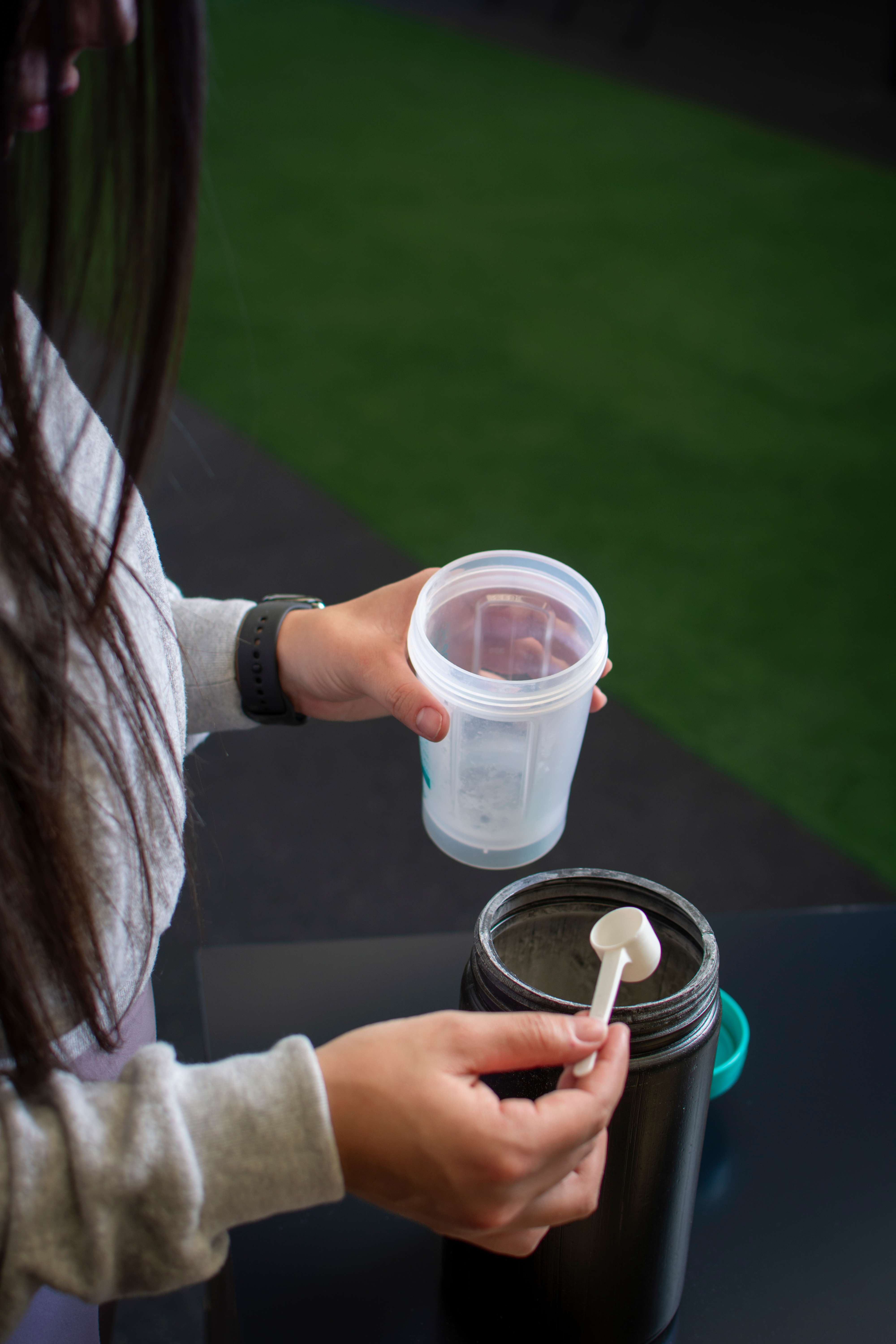Creatine has gained popularity for its muscle-boosting properties; but is it just for strength-trainers and athletes, or can everyone harness the benefits of creatine? And when is the best time to take creatine for muscle gain or to support your efforts in the gym?
Read on as we explore the science behind creatine supplements and when to take creatine to maximize its effectiveness.
What is creatine?
Creatine is a naturally occurring compound found in your muscles and produced in your liver and kidneys. It is not a protein, but a compound made up of three amino acids: methionine, glycine, and arginine. It plays a crucial role in the production of adenosine triphosphate (ATP). ATP is particularly helpful in maximizing your performance during high-intensity activities like strength training or sprinting.
Your body can produce about 1 gram of creatine per day, and you can also find creatine through natural dietary sources. However, some people choose to supplement with creatine powder or capsules to maximize its benefits.

Benefits of creatine
If you’ve never taken creatine before, you may think it’s only for body builders or pro athletes. The truth is that creatine is a versatile supplement that touts a variety of benefits — from enhancing athletic performance to supporting brain health. Here are just a few of its advantages:
- Boosts workout performance: Creatine fuels your muscles by boosting ATP, the energy source for short bursts of activity. This extra energy allows you to push harder during workouts and burn more calories.
- Supports brain health: Research suggests that increasing your creatine intake may improve brain function and provide relief from brain fog, poor concentration, and memory deficits.
- Improves muscle and bone strength: Studies show that regular consumption of creatine, along with weightlifting and exercising, can improve muscle growth in people 18 to 30 years old. Muscle growth inadvertently affects bone health, too, because as muscles grow stronger from exercise, they pull more on your bones, boosting bone strength.
- Helps muscle recovery: Replenishing ATP faster can help you push through a tough workout and recover faster in between workouts.
When to take creatine — and how much to take
You might be wondering about the best time to take creatine — and how much you should take each day. Let’s explore what science has to say about the best time to take creatine, the best creatine dosage, and whether or not you need to take it on rest days.
Best time to take creatine for muscle gain
Wondering when to take creatine for it to be most effective? The short answer is that it likely doesn’t make much of a difference whether you take it before or after a workout. Research suggests that total daily creatine intake is more important than whether you take creatine before or after a workout. However, there are some other factors to consider:
Creatine loading phase: Some people choose to follow a “loading phase” as part of their creatine regimen. This involves a higher initial intake for a short period — the most common time frame being 5 to 7 days — before tapering down. During this phase, you may take creatine several times a day, spacing out your doses throughout the day. Once you’re back to a normal dose you simply take it once a day. It’s important to note that loading is not essential and can cause digestive issues in some people.
Post-workout window: It’s well-known that your muscles are more receptive to nutrients after a workout — that’s part of the reason that post-workout nutrition is so important for muscle recovery. Because of this, some people say that taking creatine after you exercise can enhance your body’s absorption. However, consuming it with a meal throughout the day is likely just as effective.
- Convenience: Ultimately, the best time to take creatine is the one that’s easiest for you to be consistent with. If you find it’s easier to remember with your post-workout snack, go for it! If you prefer to take it before you exercise, that’s fine too.
How much creatine should you take?
The recommended dose for creatine supplements is 3 to 5 grams per day. Individual products may have different serving sizes, so be sure to read the label thoroughly and make sure you’re only taking it as directed.
How often should you take creatine? What about on rest days?
Not sure how often to take creatine? Daily supplements can often help you see the best benefits. That includes rest days, too. And it’s not just for high-level athletes; creatine supplements can be helpful for those looking to increase lean muscle and improve capacity for high-intensity exercise for overall health.
Creatine and nutrition
If you’re wondering how to consume creatine, whether or not you can take it on an empty stomach, and if creatine causes weight gain — read on.

What foods are naturally rich in creatine?
Want to find ways to boost your training without supplements? Various animal products are excellent natural sources of creatine. Here are some natural sources of creatine to consider:
- Red meat such as pork, veal, and lean cuts of beef
- Fish, particularly salmon, tuna, and herring
- Poultry such as chicken or turkey
- Dairy products including milk and cheese
Bonus: These options are also typically high in protein, another nutrient your body needs to build muscle and stay healthy.
Will creatine make me gain weight?
There’s a common myth that creatine makes people retain water or bloat. This myth likely comes from the fact that creatine can increase intracellular volume (aka, water volume in the cells of your body), but only temporarily. Studies suggest that any potential water retention likely occurs within the first few days of creatine intake, and that taking creatine does not alter total body water relative to muscle mass over longer periods of time.
Put simply: If you experience weight gain when you take creatine, it’s mostly likely temporary water retention and bloating.
Should I take creatine on an empty stomach?
You can safely consume creatine on an empty stomach, but for some individuals, it may cause more digestive upset. Taking it with a snack or meal is a safer bet to ensure you don’t have any stomach-related side effects.
Best practices for creatine supplements
Creatine is generally safe for healthy adults when used appropriately. And as you’ve learned, it doesn’t really matter what time of day you take it — as long as you can be consistent. Before you start taking creatine, however, there are a few things to keep in mind:
- Check with your doctor. It’s always a good idea to check in with your doctor before starting any new medication, vitamin, or supplement.
- Avoid creatine if you have pre-existing conditions. Studies suggest that people with kidney or liver disease — or individuals with high blood pressure — should not take creatine supplements.
- Know what’s in your supplement. Not all creatine supplements are created equally. In fact, there are many different forms of creatine. Creatine monohydrate has been the most studied and scientifically supported form of creatine since the 1990s.
- Keep up the hydration. Because creatine can draw water into your muscles, make sure you’re drinking enough fluids throughout the day to prevent dehydration.
- Watch for side effects. Some individuals report digestive issues when taking creatine. If you experience any unwanted side effects with creatine, stop using it and contact your doctor.
A final word on when to take creatine
Creatine can be a valuable tool for those looking to optimize their workouts. While the timing of taking creatine before or after a workout might not matter one way or another, being consistent with it does. Focusing on consistency, along with the proper training and nutrition, can help you truly unlock the power of creatine to boost exercise performance.
Having a personal coach who knows your fitness level, history, and goals can be a great resource for other questions you may have, such as “should I take creatine?” Try Anytime Fitness for free and ask about our personalized one-on-one fitness coaching.



